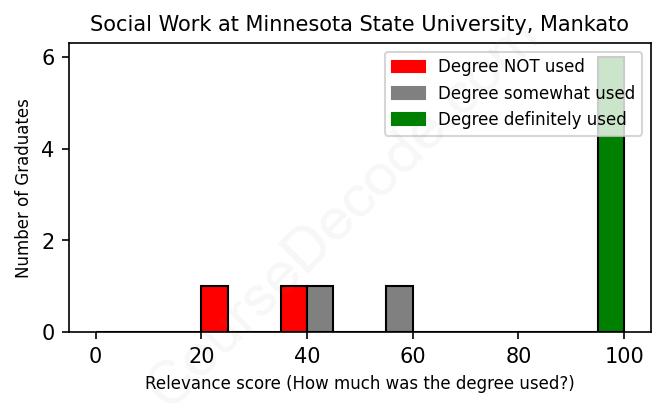
First, some facts. Of the Social Work graduates from Minnesota State University, Mankato we've analyzed , here's how many have used (or NOT used) their degree in their career:

These are estimates based on AI analysis of 10 LinkedIn profiles (see below).
The verdict? Above average. Overall, with an average relevance score of 74%, Social Work graduates from Minnesota State University, Mankato have a higher likelihood (+7%) of finding work in this field compared to the average graduate across all fields:
And for comparison, here's the chart for all profiles we've looked at across all degrees.
Also, after graduating, 50% of these graduates have pursued further education other than another Bachelor's degree (such as a Masters degree or other), compared to the average across all profiles of 35%. This suggests you may need more than just a Bachelors degree to be competitive as a Social Work graduate.
See the details:
|
Relevance score: 95% We think this person has gone into a career highly relevant to their degree. We think this person has gone into a career highly relevant to their degree.
DEGREE INFOGraduated in 2011 from Minnesota State University, Mankato with a Bachelor of Science (B.S.) in Social Work. Also pursued further education since (see below). JOB HISTORY SINCE GRADUATIONUndergraduate Social Work Intern Renville County Human Services Jan 2011 - May 2011 Child Protection Social Worker  Renville County Human Services May 2011 - May 2013 Care Coordinator/MSW Student Intern  Park Nicollet Health Services Sep 2013 - May 2014 Therapist Associate  Greater Minnesota Family Services Jul 2014 - May 2018 FURTHER DEGREES DONE SINCE GRADUATINGMaster's degreeUniversity of St. Thomas 2013 - 2014 ABOUTNo information provided. |
The top 10 most common jobs done by the graduates we've analyzed (ranked most common to least) are:
When looking at the types of jobs held by people who graduated with a degree in Social Work from Minnesota State University, Mankato, it’s clear that many of them have landed positions that are quite relevant to their education. A significant number of alumni have taken on roles like child protection social workers, crisis clinicians, and various social work positions within counties and health services. These jobs require the application of vital social work skills and knowledge, such as assessment and case management, which are fundamental to the degree's curriculum. This trend emphasizes that a lot of graduates are successfully applying what they learned in school to real-world scenarios that directly involve helping individuals and communities.
However, not all jobs held by these graduates seem directly aligned with their social work training. For instance, positions like customer care specialists or front desk managers don’t typically require social work-specific skills, even if some interpersonal skills might be beneficial. Overall, while a good chunk of alumni are working in roles that are closely tied to social work, there are also noticeable instances of graduates taking on jobs that stray from their core training. This mix shows that while a social work degree provides a robust foundation for helping people, some graduates might find themselves in various fields that don’t fully utilize their specialized education.
Here is a visual representation of the most common words in job titles for Social Work graduates (this is across all Social Work graduates we've analyzed, not just those who went to Minnesota State University, Mankato):

The career trajectories of graduates from the Social Work program at Minnesota State University, Mankato, show a strong commitment to social services, especially in the early stages of their careers. Many graduates land their first jobs as social workers or caseworkers shortly after graduation, often in settings like child protection or community services. For instance, within a year or two of graduating, you can find individuals working as caseworkers, therapists, or in various supportive roles directly connected to social work. This indicates a solid entry into the profession, aligning well with their education and training.
However, as the years go by, the paths seem to diverge a bit. While many continue to thrive in social service roles, others shift to different sectors, which may not be directly related to social work. For instance, a few graduates have transitioned into positions like school social workers, residential counselors, or even more administrative roles in healthcare facilities. Some have even moved away from social work entirely into fields like finance and customer service. So, while a good number remain committed to their roots and build successful careers in social work, there's a noticeable drift in career relevance for others, especially as they gain experience and explore new opportunities. Overall, graduates often start strong in their desired fields but may find varying levels of commitment to social work as they progress through their careers.
Getting a Bachelor’s degree in Social Work at Minnesota State University, Mankato, or really anywhere, can be a bit challenging, but it's definitely manageable if you’re dedicated. You’ll be diving into a lot of topics related to human behavior, social systems, and community issues, which can get pretty real and emotional at times. Expect some intense classes, tons of reading, and the need for good time management to keep your grades up. That said, it’s not impossibly hard; a lot of students find it rewarding and enjoy the hands-on experience that comes with it. So, if you’re passionate about helping others and ready to put in the effort, you’ll likely find that it strikes a decent balance between challenging and fulfilling!
Most commonly, in the LinkedIn profiles we've looked at, it takes people 4 years to finish a Bachelor degree in Social Work.
Looking at the career paths of these Social Work grads from Minnesota State University, Mankato, it seems like they’re in a field that might not pay super high salaries, but it can be pretty rewarding in other ways. Many of them started out in caseworker or intern positions and have gradually moved into more advanced roles like therapists or coordinators, which usually come with better pay. However, based on the roles listed, it seems like some are still in entry-level or mid-tier jobs, and the latest grads are just starting out, jumping into roles that might not exactly break the bank. Overall, while they might not be raking in huge bucks compared to other fields, many are making a decent living, especially as they gain experience and move up in their careers.
Here is a visual representation of the most common words seen in the "about" section of LinkedIn profiles who have a Bachelor degree in Social Work (this is across all Social Work graduates we've analyzed, not just those who went to Minnesota State University, Mankato). This may or may not be useful:

Here are all colleges offering a Bachelor degree in Social Work (ordered by the average relevance score of their Social Work graduates, best to worst) where we have analyzed at least 10 of their graduates: